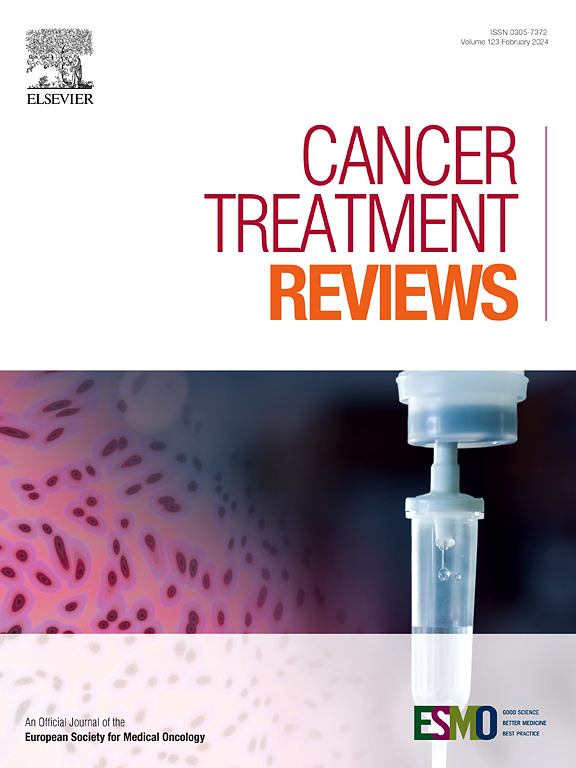乳腺癌患者辅助内分泌治疗期间局部雌激素治疗的安全性:基于荟萃分析的专家小组讨论。
IF 9.6
1区 医学
Q1 ONCOLOGY
引用次数: 0
摘要
重要性:内分泌治疗,如他莫昔芬(TAM)和/或芳香酶抑制剂(AI),是激素受体阳性乳腺癌的辅助治疗选择。这些药物与更年期症状有关,对药物依从性有不利影响。局部雌激素(TE)已被建议用于症状管理,考虑到其局部应用和可能降低的生物利用度,但其肿瘤安全性仍不确定。目的:目前的系统评价、荟萃分析和专家小组评审旨在评估在BC幸存者中,当TE与TAM或AI治疗同时使用时复发和死亡率风险的现有证据的强度。数据来源:六个数据库和两个前瞻性登记册,从成立到2024年1月3日被询问。搜索词是乳腺癌、激素替代疗法、局部雌激素/阴道雌激素和复发/死亡率。研究选择:所有报告在接受辅助内分泌治疗的乳腺癌幸存者中使用TE与不使用TE的研究设计均被纳入。6项观察性研究被认为符合纳入条件。数据提取和综合:采用亚组分析,通过偏倚风险、中位随访期、淋巴结阳性和绝经状态来探讨异质性的来源。进行试验序列分析以量化结果的可靠性。召集了一个全球专家小组对数据进行审议,查明了解有限的领域,并确定未来研究的最重要领域。主要结局和测量:报告了暴露于TE的内分泌治疗(TAM和/或AI)幸存者乳腺癌复发和死亡率的风险比效应大小(RR)和相应的95%置信区间(CI)。专家小组对荟萃分析证据的评估,并定义当前的知识差距和未来的研究目标。结果:在接受辅助内分泌治疗的38050例女性患者中,有1805例曾暴露于TE,暴露于TE的患者未增加全因死亡率(RR 0.99 [95% CI 0.58, 1.69], I2 = 81%, P = 0.96;中等等级确定性)。然而,这种暴露可能会增加复发风险(RR 2.51 [95% CI 1.10, 5.72], I2 = 9%, P = 0.03;低级的确定性)。TAM期间暴露于TE不会增加复发风险或全因死亡率。临床因素,如诊断时淋巴结阳性,绝经状态和随访时间似乎是重要的混杂因素。结论和相关性:在接受TAM治疗的BC幸存者中,TE的使用似乎不会增加复发或死亡风险。不能排除在人工智能期间使用TE会增加复发风险,但不会增加死亡率。本文章由计算机程序翻译,如有差异,请以英文原文为准。
Safety of topical estrogen therapy during adjuvant endocrine treatment among patients with breast cancer: A meta-analysis based expert panel discussion
Importance
Endocrine treatments, such as Tamoxifen (TAM) and/or Aromatase inhibitors (AI), are the adjuvant therapy of choice for hormone-receptor positive breast cancer. These agents are associated with menopausal symptoms, adversely affecting drug compliance. Topical estrogen (TE) has been proposed for symptom management, given its’ local application and presumed reduced bioavailability, however its oncological safety remains uncertain.
Objective
The present systematic review, meta-analysis and expert panel review aimed to evaluate the strength of the available evidence on the risk of recurrence and mortality when TE is utilised in congruence with TAM or AI treatment, among BC survivors.
Data Sources
Six databases and two prospective registers, were interrogated from inception to January 3rd, 2024. Search terms were Breast cancer AND Hormone replacement therapy AND topical/vaginal oestrogen AND recurrence/mortality.
Study selection
All study designs reporting the use vs. non-use of TE in breast cancer survivors receiving adjuvant endocrine treatment were included. Six observational studies were deemed eligible for inclusion.
Data extraction and synthesis
Sources of heterogeneity were explored using subgroup analysis by risk of bias, median follow-up period, node positivity and menopausal status. Trial sequential analysis was performed to quantify outcome reliability. A global expert panel was called to deliberate on the data, pinpoint areas of limited understanding, and determine the most important areas for future research.
Main outcomes and measures
Risk ratio effect sizes (RR) and corresponding 95 % Confidence Intervals (CI) of breast cancer recurrence and mortality in survivors on endocrine treatment (TAM and/or AI) exposed to TE were reported. Expert panel appraisal of meta-analysis evidence with definition of current knowledge gaps and future research aims.
Results
In 38 050 female patients receiving adjuvant endocrine treatment, of whom 1805 had been exposed to TE, TE exposure of those on AI, did not increase all-cause mortality (RR 0.99 [95 %CI 0.58, 1.69], I2 = 81 %, P = 0.96; moderate GRADE certainty). However, such exposure may convey an increased risk of recurrence (RR 2.51 [95 % CI 1.10, 5.72], I2 = 9 %, P = 0.03; low-GRADE certainty). Exposure to TE during TAM did not increase either recurrence risk or all-cause mortality. Clinical factors such as lymph node positivity at the time of diagnosis and menopausal status and follow-up time appeared to be significant confounders.
Conclusions and relevance
The use of TE does not appear to increase either recurrence or mortality risk among BC survivors treated with TAM. An increased recurrence risk, without an increase in mortality, cannot be ruled out when TE is used during AI.
求助全文
通过发布文献求助,成功后即可免费获取论文全文。
去求助
来源期刊

Cancer treatment reviews
医学-肿瘤学
CiteScore
21.40
自引率
0.80%
发文量
109
审稿时长
13 days
期刊介绍:
Cancer Treatment Reviews
Journal Overview:
International journal focused on developments in cancer treatment research
Publishes state-of-the-art, authoritative reviews to keep clinicians and researchers informed
Regular Sections in Each Issue:
Comments on Controversy
Tumor Reviews
Anti-tumor Treatments
New Drugs
Complications of Treatment
General and Supportive Care
Laboratory/Clinic Interface
Submission and Editorial System:
Online submission and editorial system for Cancer Treatment Reviews
 求助内容:
求助内容: 应助结果提醒方式:
应助结果提醒方式:


